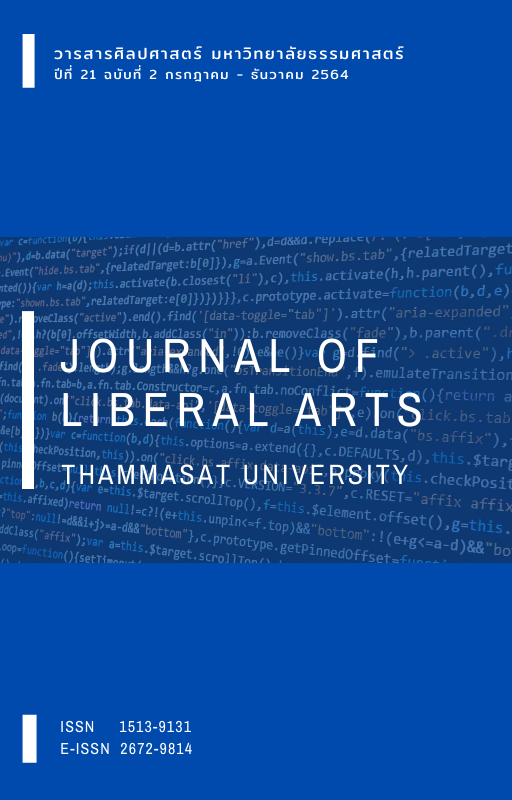Justification Supporting Knowledge on Wikipedia: Epistemology of Testimony Perspective
Main Article Content
Abstract
This article aims to justify supporting sources of knowledge from Wikipedia as testimony. This article which refers to three philosophical propositions including Tollefsen's proposition, Wray's proposition and Adisorn's proposition. In the next section, I show that the three propositions fail in the case of justifying Wikipedia as testimony. In the last part, I argue that we can justify supporting Wikipedia in the way of both reductionism and anti-reductionism, which depend on the condition of context.
Downloads
Article Details

This work is licensed under a Creative Commons Attribution-NonCommercial-NoDerivatives 4.0 International License.
References
อดิศร กรอบกระจก. (2558). การประเมินค่าทางญาณวิทยาของวิกิพีเดีย. [วิทยานิพนธ์ปริญญามหาบัณฑิต]. จุฬาลงกรณ์มหาวิทยาลัย.
อัญชลี ปิยปัญญาวงศ์. (2547). มโนทัศน์เรื่องเหตุการณ์อัศจรรย์ของเดวิด ฮูม. [วิทยานิพนธ์ปริญญามหาบัณฑิต]. จุฬาลงกรณ์มหาวิทยาลัย.
Adler, J. E. (1994). Testimony, trust, knowing. The Journal of Philosophy, 91(5), 264-275.
Burge, T. (1993). Content preservation. The Philosophical Review, 102(4), 457-488.
Fallis, D. (2008). Toward an epistemology of Wikipedia. Journal of the American Society for Information science and Technology, 59(10), 1662-1674.
Foley, R. (1994). Egoism in Epistemology. In F. Schmitt (Ed.), Socializing Epistemology: The Social Dimensions of Knowledge (pp. 53-73). Rowman and Littlefield.
Fricker, E. (1995). Telling and Tusting: Reductionism and Aanti-Reductionism in the Epistemology of Testimony. Mind, 104, 393-414.
Frost-Arnold, K. (2019). Wikipedia. In D. Coady & J. Chase (Eds.), The Routledge Handbook of Applied Epistemology (pp. 28-40). Routledge.
Giles, J. (2005). Internet encyclopaedias go head to head. Nature, 438, 900-901.
Gelfert, A. (2014). A Critical Introduction to Testimony. Bloomsbury.
Goldman, A. I. (1999). Knowledge in A Social World. Oxford University Press.
Hume, D. (1748/1977). An Enquiry Concerning Human Understanding. Hackett Publishing.
Jankowski-Lorek, M., Ostrowski, L., Turek, P., & Wierzbicki, A. (2013). Modeling wikipedia admin elections using multidimensional behavioral social networks. Social Network Analysis and Mining, 3(4), 787-801.
Lackey, J. (2006a). Introduction. In J. Lackey & E. Sosa (Eds.), The Epistemology of Testimony (pp. 1-24). Clarendon Press.
Lackey, J. (2006b). Knowing from Testimony. Philosophy Compass, 1(5), 432-448.
Lackey, J. (2011). Testimony: Acquiring Knowledge from Others. In A. Goldman & D. Whitcomb (Eds.), Social Epistemology: Essential Readings (pp. 71 – 91). Oxford University Press.
Magnus, P. D. (2009). On Trusting Wikipedia. Episteme, 6(1), 74-90.
Tollefsen, D. P. (2007). Group testimony. Social Epistemology, 21(3), 299-311.
Tollefsen, D. P. (2009). Wikipedia and the Epistemology of Testimony. Episteme, 6(1), 8-24.
Weiner, M. (2003). Accepting testimony. The Philosophical Quarterly, 53(211), 256-264.
Wray, K. B. (2009). The epistemic cultures of science and Wikipedia: A comparison. Episteme, 6(1), 38-51.
Xiao, L., & Askin, N. (2012). Wikipedia for academic publishing: advantages and challenges. Online Information Review, 36(3), 359-373.


